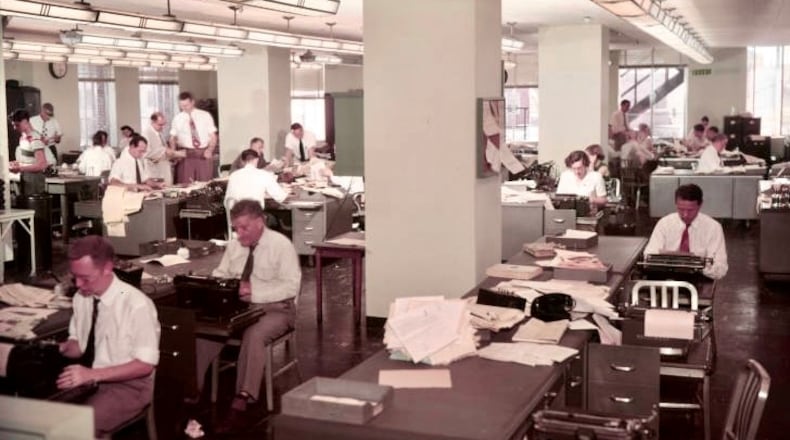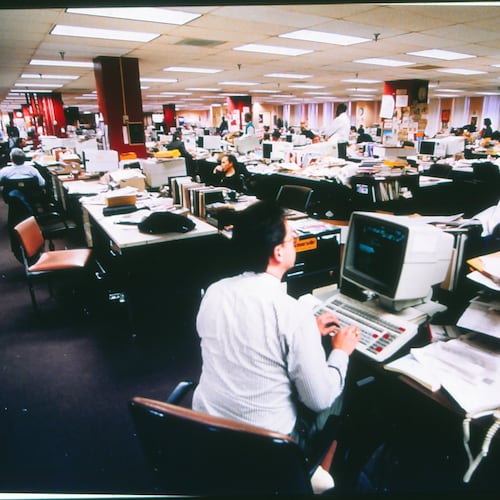I went to The Atlanta Journal-Constitution newsroom recently to grab some of the long, slender 4-by-8-inch reporter notebooks I’ve used every working day for nearly four decades. Being a creature of habit, I can’t think of recording life around me any other way.
The building, near Perimeter Mall in Dunwoody, is as ghostly silent as it’s been since mid-March 2020, when the world shut down. The world, of course, didn’t really shut down. It actually got busier, stranger and a bit meaner during the many months of fewer people out and about. And I’m reporting on all of it from my basement.
The sixth floor, where there are perhaps 200 desks for reporters, editors and digital specialists, was eerily empty. On one colleague’s desk was a yellowed copy of the Journal-Constitution’s March 10, 2020, edition with the stark headline, “STOCKS, OIL PRICES PLUMMET; VIRUS CLOSES FULTON SCHOOLS.”
It was like a storytelling device from an end-of-the-world flick to flash back on what regular life was before “The Event.” Or at least as that event was becoming apparent.
Credit: By Bill Torpy, AJC
Credit: By Bill Torpy, AJC
I rifled through my desk to snag some personal items. Recently, we were told that this fall we’d be moving to smaller, more spartan digs where junk collectors such as myself will be without our very own work ecosystems. That is, our own desks. We will be, as the kids say, “hoteling” or using “hot desks,” meaning you bring your laptop to the office and grab whatever empty space is available, one that has none of the personal accoutrements that made your space you. In fact, I think you’ve got to reserve a spot ahead of time: “Torpy, you’ve got Row 3, Space B.”
My bosses had sent memos urging me to clean up the heaping piles of government reports, lawsuits and reporter notebooks accumulating on my desk, although I resisted, figuring someday I might need all of it. But someday is not coming because the bosses need our belongings out of there NOW and that stuff will only enter my house if I cart it across my wife’s dead body.
It was a sad moment thinking about no longer turning to sports columnist Steve Hummer to try out one-liners. Or no longer arguing ceaselessly with airline industry reporter Kelly Yamanouchi, or discussing pop-psychology and economics with business writer Mike Kanell, or nosing around my fellow reporters to see what they’re up to and steal ideas. Or no longer (this is the best) grossing out editor Colleen McMillar by whipping up eggs in a bowl of overheated Campbell’s chicken noodle soup for a quick eat-at-your-seat lunch favorite.
Those are the things one does in a newsroom, or, more specifically, the kinds of things people do in workspaces. It is human interaction. Now we’ll be doing less of it.
I understand why. We must save money. Newspapers have had one foot in the grave and the other on a banana peel for at least 15 years. According to the University of North Carolina journalism school, nearly 1,800 newspapers in the U.S. have closed since 2004, including 60-plus dailies and 1,700 weeklies. It’s the kind of thing that should scare away students from the business. Yet for some reason, God love ‘em, it hasn’t. The news business needs fresh, eager and talented people more than ever.
Newspapers that have remained upright have been slashed, trimmed, shrunk, right-sized and sold for parts. Properties have been dealt away, salaries reduced, and days of publication cut. Corporate raiders (i.e. hedge funds) have gobbled up wobbly media companies and squeezed every drop of ink they could out of them.
We who have remained toiling at The Atlanta Journal-Constitution have been comparatively fortunate in the midst of this media hellscape. The AJC is owned by the Cox family, which has published broadsheets for four generations going back 125 years, and they know the value of news to a community. Most of us at the AJC got raises and bonuses this year, even though the business environment has been merciless. The Journal-Constitution still hires people. And whenever some very high-level politicos complain about my musings, the AJC has my back.
Instead of retrenching, the company has doubled down with a marketing campaign that recalls gritty basics of journalism. It’s called “Press On,” and it revels in old-fashioned shoe-leather reporting — as in going out and talking with people, pulling documents that no one wants you to read, and afflicting the comfortable.
So, if it comes down to spending money on reporters or on rent, I’ve got to go with the former.
Last year, Tribune Publishing announced it was shuttering the newsrooms at four of its papers, including The New York Daily News and The Orlando Sentinel.
There is something lost with virtual relationships. I still call my colleagues to ask them “What’s up?” to get a sense of what’s happening. But it’s not the organic feel of sidling up to someone’s desk, brainstorming on a topic and overhearing conversations. Decades ago, when I began, there was still the rat-a-tat-tat of typewriters amid the computers, the ring-a-ding-ding of telephones on every desk, and the yakety-yak-yak of recalcitrant reporters squabbling with editors.
There’s an institutional knowledge that one absorbs in the newsroom by osmosis, an organic transference of knowledge, often in a just-in-time basis.
Newsrooms had open-space layouts before such configurations were de rigueur. It was a landscape where you could yell across five desks to determine if a colleague had finally gotten that vital confirmation for the story as deadline loomed. The open forum allowed for an easy exchange of ideas. But there was always one co-worker who was a bit too vociferous, so if deadline approached, I’d toss on my shooting earmuffs, the international symbol to “Shut the #$@! up!!”
Now, reporters should not be cooped up in a newsroom all that much. Rather, they should be regularly haunting courthouses, city halls, crime scenes, neighborhoods, stadiums — any place where news is happening.
The newsroom has had a mythical place in Americana since the 1930s movie “The Front Page” paid homage to 1920s journalism. It’s a place where editors shouted “Stop the Presses!” and frazzled, fedora-wearing reporters stubbed out cigarette butts while banging out copy, then reached into a colleague’s desk for the bottle of whiskey stashed away to celebrate the Big Scoop.
But in recent years, modern mores and human resources departments have changed the newsroom atmosphere to one resembling an insurance office. Before, you’d race back from the scene to an editor impatiently asking, “Whatcha got?” Now you correspond via Zoom or Slack.
I suppose there will be more editors than reporters heading to the slimmed-down version of the modern newsroom. They don’t get to be out in public as much. But we’ve all become accustomed to working in our sweats out of the spare room at home. And as time marches on, another vestige of our storied past will march into foggy memory.
Although now, I can keep my own bottle of whiskey handy.
I don’t think the HR department will mind.
About the Author
Keep Reading
The Latest
Featured





